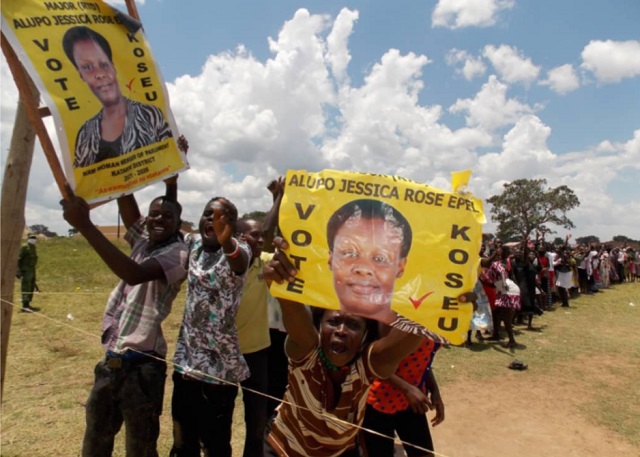
Warnings on violence ignored
Even as far back as September 2019, several political pundits have been warning that the coming general election of 2021 will be very violent.
Two civil society organisations, the Women’s Democracy Network Uganda and the Innovation for Democratic Engagement and Action (IDEA) in August 2019 released a report predicting that the 2021 general election will be the most violent ever in Uganda.
The report titled, “Early warning signs for violence in Uganda’s 2021 elections and structures and strategies for mitigation” found that 83% of people surveyed in 13 districts across the country feared violence will be ‘unprecedented’ in the next election.
Based on this, many commentators say the violence seen in the NRM primaries shows what could happen in the 2021 general elections.
Earlier, Job Kiija, the director of IDEA, listed what many pointed out would be the causes of the violence; unresolved tribal issues, failure to have a trusted election management systems, and the involvement of security agencies in partisan politics.
At the time, Perry Aritua, the executive director of Women’s Democracy Network-Uganda told The Independent that there was growing political intolerance.
“People do not want to listen to each other as long as they come from different political groups,” she said. In the survey, political intolerance stood at 32.6%.
Aritua also said political leaders were not doing enough to diffuse the tension that is building ahead of the 2021 election.
“The government must find solutions to the causes of election violence before the country goes up in flames,” she said.
Although what has been witnessed so far has been confrontation within the NRM party, many commentators warn that the worst will come soon; between “the yellow colour (for the ruling National Resistance Movement) and red, for the People Power Movement” of Bobi Wine.
The 2021 election landscape has been drastically altered by the COVID-19 pandemic and the so-called “scientific” or digital elections without the usual campaign rallies. But the main issues identified in the survey remain relevant.
The main causes of violence in 2021, according to the survey, will be a lack of political reforms, formation of new political parties, failure to find solutions to previous causes of electoral violence, oppression of the opposition, political intolerance, banning opposition politicians from radios and dispersing political rallies among others.
Already opposition politicians have been complaining about the police and other security agents who arrest opposition politicians allegedly flouting the COVID-19 Standard Operating Procedures (SOPs) that ban campaign rallies and processions, while letting ruling NRM party politicians to campaign.
“Belonging to the ruling party (NRM) does not place anyone above the law. NRM members should instead be at the forefront of implementing the COVID-19 preventive guidelines because they were issued by the Government,” said Leader of Opposition in Parliament (LOP), Betty Aol Ochan, recently.
More than 20 people reportedly died in election-related violence before, during, and after the 2016 elections. Many more were beaten and suffered severe injuries.
Life and death elections
Holding political office has increasingly become “a matter of life and death”. Many commentators attribute this to the opportunities for self-enrichment, mainly through corruption and high salaries and perks available to politicians while the rest of the population gets poorer.
The increased interest in political positions by people close to President Museveni, including his brother and daughter- in-law, and close confidants points to another growing trend. Former Vice President Gilbert Bukenya who had quit elective politics is back in the hunt for an MP seat.
“Those people have money and influence but that is not enough for them,” said one commentator, “They now want power because influence without power is nothing.”
As renowned political publications such as the Africa Research Institute have pointed out that election violence often erupts partly because “elections can exacerbate existing tensions”.
In briefing notes, the Africa Research Institute notes that “the compulsion to retain public office – and susceptibility to resort to violence – is most pronounced in countries where state resources are the principal, or most easily accessible, repository of economic opportunity. Where elections are “winner takes all” contests, violence is a cheap and effective electoral device.”
It points out that the prevalence of electoral violence is a clear signal of the possibility of more widespread and protracted strife.
Election violence is not unique to Uganda.
As opposition politician Nobert Mao, who is the president general of the Democratic Party, pointed out recently during a TV talk show, Uganda has witnessed election violence for a long time.
Mao said the causes of election violence remain the same; distrust of the election organisers, involvement of security forces on one side, and rigging of the elections.
The Africa Research Institute points to the recurrence of factional clashes in northern Nigeria that followed Goodluck Jonathan’s victory in the 2011 presidential election. More than 800 people were killed in the fighting.
Perceived consolidation of power by politicians from the predominantly Christian south, and enduring economic disparity between northern and southern states, fuelled the unrest.
Then there were the clashes in Kenya’s Rift Valley following the 2007 elections. According to the Africa Research Institute briefing notes that violence reflected grievances among Kalenjin and Maasai over traditional lands allocated to Kikuyu in the 1970s by President Jomo Kenyatta.
 The Independent Uganda: You get the Truth we Pay the Price
The Independent Uganda: You get the Truth we Pay the Price


